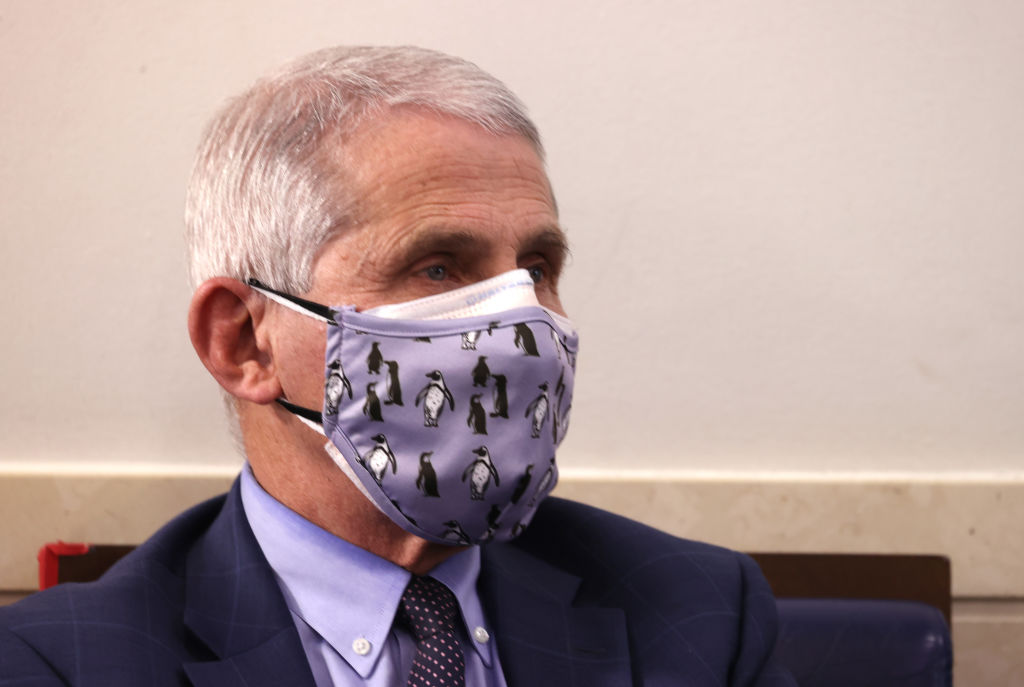Health experts have said it for months: wearing a mask is simply one tool in the fight against COVID-19. But, as new variants emerge, some suggest wearing just one mask may not be enough.

In the United States, that country’s top infectious disease expert, Dr. Anthony Fauci, suggested wearing two masks — or double masking — will be more effective.
“So, if you have a physical covering with one layer, if you put another layer on it, it just makes common sense that it likely would be more effective,” Fauci said on Monday.
When asked if Canada would recommend a similar messaging, a spokesperson with the Public Health Agency of Canada (PHAC) said it was aware of the comments made by Fauci, but said: “It is important to recognize that Canada’s context is different from the United States.”
One infectious disease expert suggests doubling up single layer masks could be more effective — when used properly.
Dr. Lynora Saxinger with the University of Alberta cautioned against blindly adding layer upon layer upon layer, saying people should pay attention to how well the mask fits and if there is proper breathability.
“We do know that increasing the number of layers of a mask can improve the performance of a mask, at least in lab-type conditions.”
“For a lot of people, if they’re used to wearing a very simple and single or double-layer mask, adding extra layers might actually improve the safety… If you’re going to double-mask, make sure that the fit is good, and that you’re able to breathe through the mask quite reasonably well. Those would be the concerns I would have with people layering on too much that you might actually lose off on the ability to breathe through them.”

In November, PHAC recommended the addition of a third filter layer to “improve the level of protection provided,” recommending Canadians choose a mask that includes a filter or filter material as one of its layers, including a non-woven polypropylene fabric or a disposable filter inserted into the pocket of the mask.
Single-layer masks are deemed not as effective compared to the triple-layer masks and can vary greatly in quality and filtration, according to Saxinger.
She also adds that when three-layer masks with a filter are used, they can be just as effective as non-surgical masks or N95 masks.

Demand for non-surgical masks has skyrocketed, according to Montreal-based Medicom, a manufacturer and distributer of infection control products.
Its chief operating officer, Guillaume Laverdure, said the company saw a 10x increase in demand since the start of the pandemic — something he attributed to increased knowledge and awareness.
Laverdure said demand has softened slightly but they are still seeing demand levels about three times the average pre-pandemic.
“One of the things that the pandemic has revealed is that not every mask is a good mask… Governments or people (are) trying to get away from fabric masks because they realize it’s not good protection against a virus,” Laverdure said.
He said the continued demand for non-surgical masks is linked to increased COVID-19 contamination, increased awareness and regulation that some countries are taking.
France recently banned low-quality homemade cloth masks, with the hope of slowing the spread of a variant there. Canada has no plans to follow France’s lead but maintains homemade masks can work in slowing the spread of the virus, when used properly.
The renewed message comes with calls that masking up is only one weapon in the fight against COVID-19.
Officials are reminding Canadians that in addition to masking up, they are encouraged to keep their distance of six feet apart, wash their hand regularly and stay home if sick.
PHAC said it will continue to monitor the situation and will adjust its guidance if further such evidence emerges.
Alberta Health also said there is no change to its masking recommendation at this time.






Comments